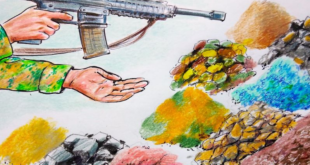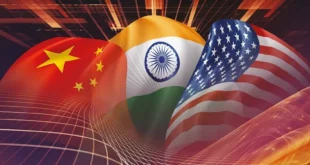One hundred years ago, 13 young Chinese men and two Comintern representatives met secretly in Shanghai’s French Concession. Fearing discovery by police, they soon fled to nearby Jiaxing, where they had to conclude discussions on a pleasure boat.
From these unpromising beginnings sprang the world’s largest and most powerful political movement: the Chinese Communist party, now 92 million strong. Within 30 years, it would control the country. A century on, it has grown into a behemoth that controls a fifth of the world’s population and its second-largest economy, and is shaking the confidence of its superpower, the US. To detractors, as well as supporters, its feat looks truly incredible. Three decades after its patron and rival, the Soviet Union, collapsed, the CCP is looking ahead: “We must march forward towards the second centenary goal,” its leader, Xi Jinping, said as celebrations of Thursday’s official anniversary gathered pace.
The party has remained ruthless and disciplined in enforcing and maintaining its power. It viciously represses dissent, crushes basic human rights and invests heavily in propaganda and the most sophisticated censorship and surveillance in the world. But it has prospered by promising and delivering people better material conditions too. Earlier this year, Mr Xi boasted of ending extreme poverty (though the party has not done so by international standards, inequality is high and the welfare net, while much improved, is still very basic). The urban middle classes have prospered, but the days of double-digit growth are over. More potent perhaps is the message that without the party there would be chaos, buttressed by China’s performance compared with the west in the 2008-09 financial crisis and the pandemic, as well as its own turbulent history.
Above all, Mr Xi has doubled down on a narrative of national rejuvenation, with the party returning China to wealth and power after decades of humiliation. History is at the heart of his project, but only as written by the CCP: a hotline was set up to report “historical nihilism” ahead of the centenary. China’s undeniable advances after it took over – including soaring literacy, rising life expectancy and better rights for women – were matched by tragedies that cannot be discussed there. As many as 40 million died in the famine created by Mao Zedong’s Great Leap Forward. Millions more died or were hounded in the Cultural Revolution. In 1989, the party turned its guns on the people, crushing the demonstrations that began in Tiananmen Square.
These days, its repression is felt most harshly at the margins: in the trampling of freedoms promised to Hong Kong and, above all, the devastating treatment of the Uyghurs in Xinjiang. But rights lawyers, feminists, entrepreneurs and even Marxists on the mainland have all come under intense pressure. The party’s own unlikely triumph makes it paranoid about dissent and foreign influence.
It has been surprisingly flexible at key points: turning to the peasantry as the agents of revolution; embracing the market. But under Mr Xi, who has dismantled term limits and built a cult of personality, it looks increasingly rigid and centralised. Critics warn that there are no checks and balances, fear that no one dares to challenge him, and say that officials are too scared to use their initiative. One danger is sclerosis; another is eventual turmoil. Meanwhile, the environmental costs of breakneck development are catching up with the country and other nations are pushing back against its growing assertiveness. Is the CCP showing confidence – or hubris?
Many people have bet on the party’s demise and lost. Chiang Kai-shek’s nationalists, the free market and the internet have all failed to see it off. But the real lesson of its success is that no one can predict what lies ahead – and the CCP knows it. A hundred years after it set out to remake the minds and transform the fortunes of the Chinese people, it still cannot trust them with the truth, the chance to speak freely, or the right to choose their own leaders.
 Eurasia Press & News
Eurasia Press & News



